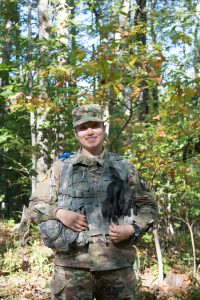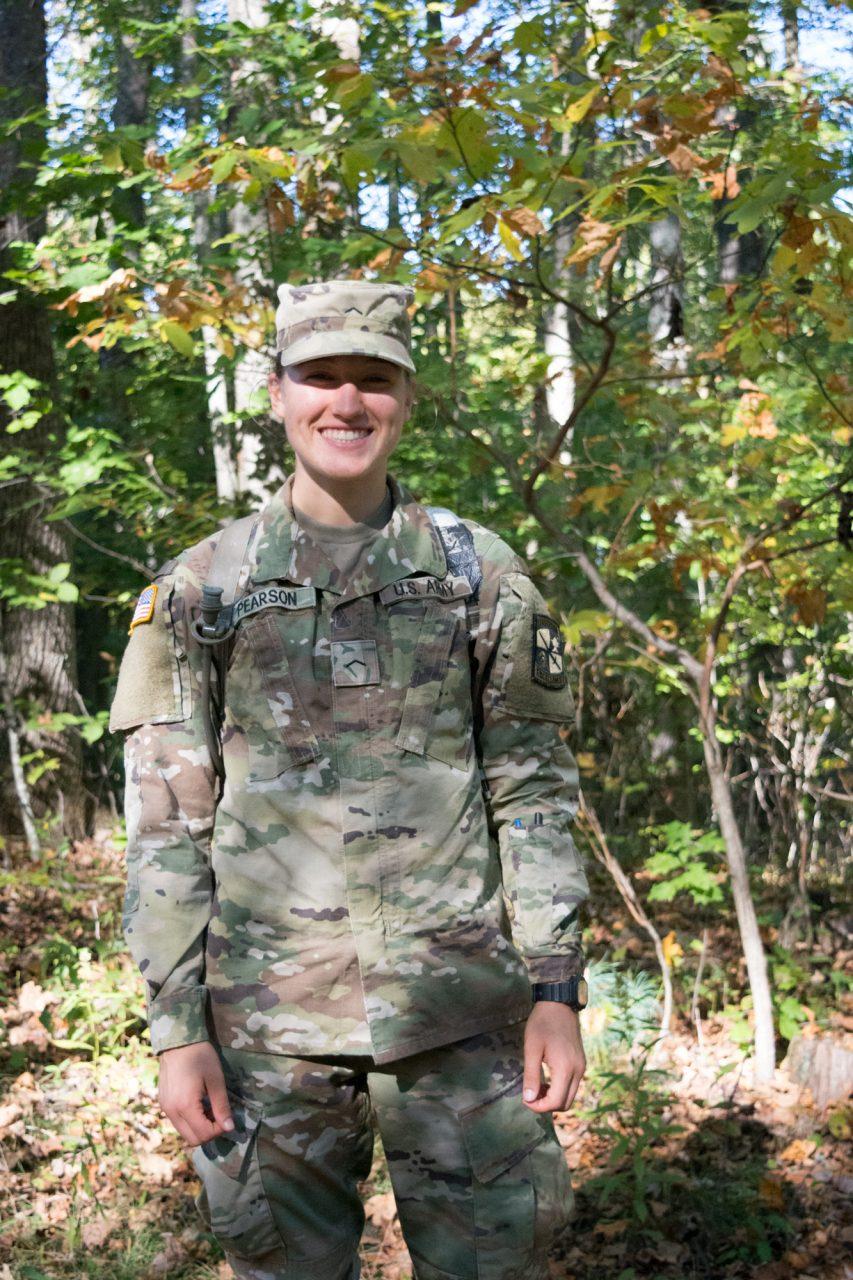BOONE — Appalachian State offers many different programs and clubs for students to participate in to find their home in the High Country. One of the programs with a deep history at Appalachian is the Reserve Officers’ Training Corps, or the ROTC.
“The ROTC teaches many things like leadership, time and stress management, wellness, Army values and ethics and Army officer history,” freshman ROTC instructor D.J. Weatherford said.
The ROTC is broken up into two parts: basic training for a cadet’s freshman and sophomore year and advanced training for their junior and senior year. Advanced training is when a cadet is given the option to become an officer in the Army.
“ASU ROTC first commissioned officers in 1971,” Weatherford said. “Since that time it has produced 918 officers. One hundred and one of them have been female. The first female officer was commissioned in 1977. Over the history of the program we average three females per commissioning class.”
In the Army as a whole, 18 percent of the force are female officers. In the current ROTC class, there are 19 female cadets in the basic training course and three female cadets in the advanced training course.
“I’ve always wanted to be in the military,” freshman Lydia Pearson said. “The military fits my mindset.”
Others, like sophomore cadet Heidi Robinson, became interested in the ROTC through experiences in high school.
“In high school, I did JROTC and really liked the atmosphere. I like being active and ROTC keeps me active. I never thought I would go into the military and then I started researching Army ROTC,” Robinson said.
Sophomore ROTC member Angela Ruiz said she was impacted greatly by her experience in the JROTC and that it helped build her into the person she is today.
“That class introduced me to a different culture and I loved it,” Ruiz said. “I felt like I could really contribute to the military, and so it lead me to pursue ROTC.”

Junior Kylie Mattingly and sophomore Taylor Guiles tied their start in the ROTC to familial influences.
“I got involved with ROTC because both of my parents have served in the Army,” Mattingly said. “Growing up in a military family caused me to want to pursue a military career.”
“I got into ROTC because my mother and brother are both in the Army,” Guiles said. “They have set a high standard of integrity and selflessness in our household growing up, a standard I want to follow and continue to set for my future family.”
Each of the five cadets in ROTC have decided to pursue different career paths in the Army, with many jobs available to them after they graduate.
“When students graduate from the ROTC program they are Army officers,” Weatherford said. “We usually take on 20 cadets each year. There are all sorts of different jobs available for cadets once they graduate.”
Pearson said that she plans to go into aviation once she graduates from the ROTC.
“I would like to get into aviation because I want to learn to fly and when I was younger I wanted to join the Air Force,” Pearson said.
Robinson and Guiles are both pursuing a career in nursing. Robinson said that she hopes to work with children, while Guiles said that she would like to provide aid to disaster-ridden countries.
“I want to be a pediatric nurse, but I don’t know how long I’ll be in the military,” Robinson said. “I’ll do my first three years and then see if I want to continue.”
“I hope to be a nurse in the Army and would like to get deployed on humanitarian efforts more than to hostile territories,” Guiles said, “such as when Pakistan had an earthquake a few years back, a CSH unit was set up to aid them.”
Mattingly and Ruiz both said they envision a career as active duty officers in the military with hopes to maintain that career for most of their lives.
“I hope to see myself become an active duty officer and would like to be involved with military intelligence,” Mattingly said. “I hope to maintain a career in the Army for many years if possible.”
The courses in ROTC create many beneficial challenges for students and the different clubs within ROTC offer opportunities for extracurricular group activities.
“There’s a club called Commandos in ROTC. Last semester, I was the only female in the club,” Robinson said. “When I got to the event, it was hard because I was surrounded by guys. It was a different atmosphere, but I got through it. I like Ranger Challenge and Mountain Man because we compete at both. You train each morning with the people in the groups and you bond together. We had an all female team last year and it was great because we built this friendship. It’s challenging but rewarding.”
Ruiz also enjoys the clubs the ROTC offers and said, “The extracurriculars offer a way for us to get to know each other and grow to work close with each other, learning our strengths and weaknesses. Overall, it helps improve our comradery and grow together as a team.”
“Most cadets love the labs and hands-on training. Being with individuals that are like-minded is also enjoyable,” Weatherford said. “We do the extracurricular activities to help give cadets an idea if this program is something they want to continue.”
Besides offering club opportunities and hands-on training, the ROTC offers cadets a chance to create a community within the program.
“Coming off of basic training and then coming here, I really miss the family I made over the summer,” Pearson said, “but now that I’m here, I’ve created a new family. If you surround yourself with people you care about, then you’ll be successful. That’s what I like about ROTC. Even in the month I’ve been here, I feel like I’ve done a lot of growing.”
Junior economics and Spanish major and former ROTC cadet Destiny Rider said she enjoyed the family atmosphere.
“I liked feeling a part of the team that was working toward a common goal. I loved how competitive it was and that you had to create a name for yourself through your display of skills and ability to grow,” Rider said.
While the ROTC may have enjoyable moments, there are challenges within the program. Cadets must pass grueling physical training tests and organize their schedules around the ROTC and academics.
“I’d say the time management is the hardest part of ROTC,” Weatherford said. “The difficulty would probably differ from student to student. The first two years aren’t that overwhelming.”
“Time management and balancing my responsibilities has to be the hardest thing for me to deal with while being in ROTC,” Mattingly said. “I have to balance working around 30 hours per week at my job, going to school full time, going to the gym multiple days a week, putting effort into my relationship and participating in events related to ROTC. There’s a lot of things I can’t do sometimes because of how busy I am.”
Over the past several years, women in the Army have made great steps to overcome gender discrimination. Female cadets in the ROTC continue this trend fighting back against stereotypes.
“The Army is more forward leaning than most institutions across the chain,” Weatherford said. “I don’t think there are any institutional biases, at least none that I’ve seen. We’ve gone towards a gender-neutral route, where if anyone, male or female, fits the requirements for a position, they can have that position.”
Weatherford claimed that, in the ROTC at App State, if a cadet was discriminatory toward a female cadet in the program they would be handled according to protocol.
“There’s a process to deal with discrimination, and a process for sexual assault,” Weatherford said. “If someone came to me and told me they’d been discriminated against, I’d sit down and talk with the individual. If a cadet is discriminating another cadet, they are distracted from the mission. We identify as soldiers, not as male or female. Confrontation is how we stop discrimination.”
As a female in a male dominant field, Ruiz said she leads by example in the ROTC by being herself.
“Representing females in a minority group, I can be a role model for young girls to see that it’s okay to be different and go down different paths,” Ruiz said. “I want them to feel like they can achieve anything and that their gender should not hold them back. I will lead by example and demonstrate that even though I am a female in a male dominant organization, I can still get far in my career and be successful.”
Overall, the ROTC on campus helps provide students with a view into the military. With a combination of physical training, hands-on courses, clubs and a community of like-minded individuals, the ROTC prepares powerful women for the world of the military and all it has to offer.
“You want to lead from the front,” Pearson said. “You want to work harder to motivate people. I have the mentality that if you think one way, that’s what you’re going to become. I don’t think it has anything to do with me being female. I work just as hard as everyone else in the program. Hard work is hard work and that is what is going to help me succeed.”
Story by; Anna Muckenfuss, Intern News Reporter
Photo by; Lindsay Vaughn, Senior Photographer


